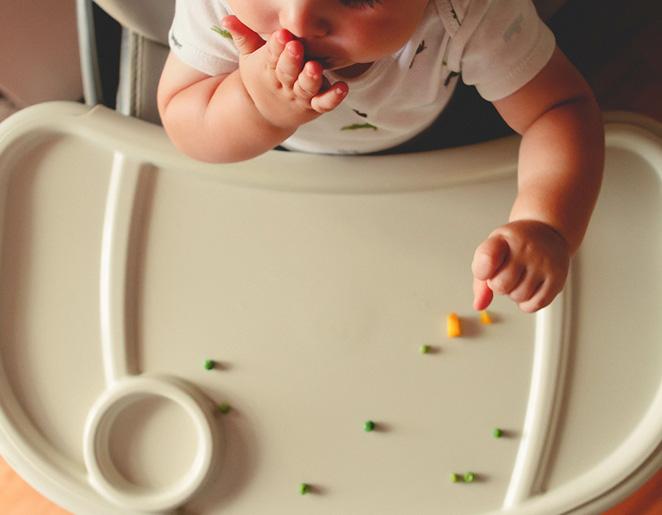
Developing a positive body image and a healthy relationship with food: Give your kids a head start!
Read the article 29 June 2021


Some are already raving about the food that mom and dad eat at the table at around 6 months of age. They are ready and they want it! Others show no interest to taste even a bite of puree, truly preferring Mommy’s milk… If you are worried because your little love eats very little solids, we’ll set the record straight!
Different towards food!
From birth, some babies can sometimes be described as “gluttons”: they drink a lot, gain weight well, and have a growth rate that surpasses all other infants. Conversely, some children are born with a small appetite: they gain weight, but with more difficulty. They drink milk, but seem full more quickly… Once solid foods have been introduced, it’s not surprising that babies who have always had a big appetite are interested in eating. Conversely, it may take longer for some babies to “connect” well with food. So don’t worry if your baby seems to be eating very small amounts, especially at the beginning of dietary diversification. Up to one year of age, breast milk or infant formula is a wonderful supplement to their food intake, even if it’s low.
Strategies to stimulate interest
If your child is developing normally and does not show signs of deficiency that worry you (constant fatigue, no energy to play, weight loss…), we suggest a few strategies to help him discover new flavors at his own pace:
1- Respect his appetite
Beware of this vicious circle:
Baby doesn’t want to eat → you put food in his mouth to get him to eat → he nibbles and pushes the food away → you show disappointment and tell him you wish he would eat to make you happy → Baby doesn’t want to eat.
Sooner or later, this strategy of “forcing” the child to eat will only maintain the refusal of food. Eating must remain a pleasurable experience if your baby is to have the desire to experiment. When your cutie doesn’t seem receptive, don’t insist. Let him explore the food with his fingers: the texture and colors may interest him, and then, one day, he will be curious to taste it!
2- Consider mealtime and milktime
Because breast milk or infant formula is high in energy and quickly fills a baby’s small stomach, try to feed your child milk at least 30 minutes before meals. Drinking too close to meals can spoil your toddler’s appetite. Milk served during mealtime can also reduce your little one’s desire to explore! Wait until your baby starts to eat and to explore his tray or spoon greedily before offering milk. If your baby is older and drinks cow’s milk, the same rule applies.
3- Stimulate your child’s interest in food
Even before your baby starts solids, sit him around the table with you at mealtime. Offer him plastic spoons, bowls, glasses, etc. Introduce him to safe foods that he can handle (e.g. a large and well washed orange; a large, cleaned and peeled carrot…) This will initiate a first contact with food and make your little one curious to taste it when the time comes.
When your baby is ready to eat, offer him very small quantities first, especially if you know that he has little appetite. Even if he doesn’t eat it, it’s a good first step to get acquainted with the food offered, if only by touch or smell!
Sit with your baby when he eats. Taste the food with him, show him your enthusiasm: “Mmmm! It tastes so good! Taste it!” It’s reassuring for a baby to see that his parents are eating the same food as he is.
In any case, a baby with a poor appetite is not always a bad sign. As with adults, some babies are always hungry, while others will skip breakfast! The important thing is to trust yourself: consult a health care professional if you see that your baby’s growth is at stake and his general condition is deteriorating.